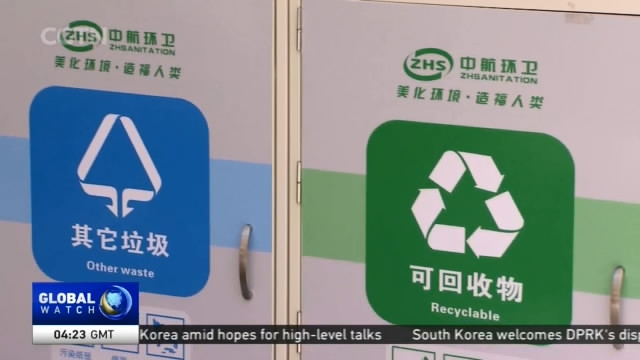
13:19, 05-Feb-2018
China's Rural Revitalization: Tonglu county makes garbage sorting routine for residents

The No. 1 Central Document also focuses on living conditions in rural areas, where garbage treatment has long been a big problem. But one county in East China's Zhejiang Province has come up ways to encourage local villagers to sort their garbage. CGTN's Tang Bo went to Tonglu County to find out how.
Another routine get-together. Every ten days, residents of Xiwushan Village in Tonglu County come to this small exchange station to receive some daily necessities for free. Well, not totally free. They have to bring some recyclable garbage in exchange.
TANG BO TONGLU COUNTY, ZHEJIANG PROVINCE "This is one of more than 100 exchange stations in Tonglu County where villagers come to exchange garbage for useful household items. For example, locals can exchange 300 cigarette butts for 1 cigarette lighter, or 80 used batteries for 1 bar of soap. When government officials first launched the project, they were not sure if the villagers would bother to take part. But they have seen surprisingly good results."
VILLAGER "Less exposed garbage means fewer bugs and mosquito. I feel fresh living here."
VILLAGER "The exchange station works well. You don't see many cigarette butts on the streets anymore.”
The exchange station opened late last year as a new garbage sorting method by the local authorities. The items given in exchange are not expensive and they are even bought with money donated by the villagers themselves.
XU WEN, CPC COMMITTEE SECRETARY JIUXIAN SUB-DISTRICT, TONGLU COUNTY "The villagers don't actually care how much these goods cost or how good they are. They have been impressed by and have benefited from the changes to the environment. No more smelly garbage. Instead, they get fresh air and clean streets. That is why they are happy to cooperate and continue to do so."
Adding to Tonglu county's efforts, a pilot smart garbage sorting program has been created by a third-party company. All people need to do is put their trash on top of the device to be weighed, and scan their ID cards to receive credits given for the weight of their trash. The credits can be used to get some daily necessities for free, or even pay electricity and water bills. The program has been able to help local authorities do some big data analysis.
REN HANBIN, PROGRAM MANAGER ZHEJIANG SANITATION CO., LTD "All the devices are connected to our control center, so we are able to find out how much trash this neighborhood creates per day, especially compostable garbage. This way we can help local authorities find out how much organic trash they can reduce by composting and reusing it, so as to avoid redundant investments and garbage treatment."
Reducing garbage by reusing it is one of the principles guiding the county's garbage treatment. Organic trash like kitchen waste will be sent to this fertilizer factory for further processing. By mixing it with livestock waste, it can be made into organic fertilizer and sold in supermarkets. As a result, the county has reduced garbage incineration by an average of 70 tons per day. That, in turn, has largely reduced the secondary pollution of transporting trash, and brought down greenhouse gas emissions from waste incineration.
ZHU HUA, CPC COMMITTEE SECRETARY TONGLU COUNTY, ZHEJIANG PROVINCE "The environmental protection industry should form its own ecology. This requires a sound industrial chain, value chain, and service chain, such as trash recycling, processing, and marketing in this case."
Back at the exchange station, behind the bars of soap and washing machine powder. There are people proud to see a better environment that they have created themselves and for themselves. Tang Bo, CGTN, Tonglu county, Zhejiang Province.

SITEMAP
Copyright © 2018 CGTN. Beijing ICP prepared NO.16065310-3
Copyright © 2018 CGTN. Beijing ICP prepared NO.16065310-3